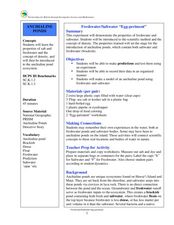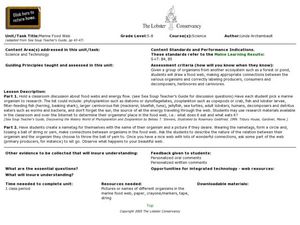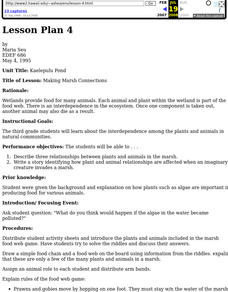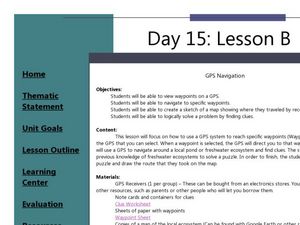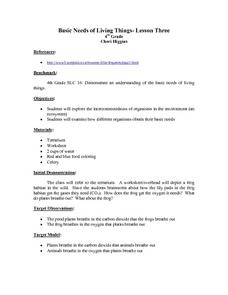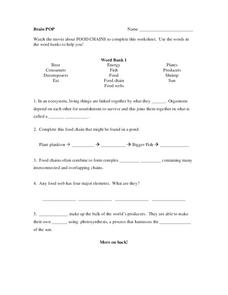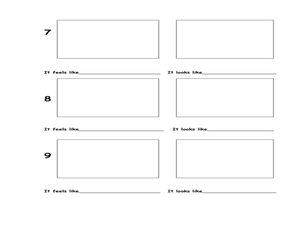Curated OER
Freshwater/Saltwater "Eggs-Periment"
Students explore water properties by conducting a class experiment. In this buoyancy instructional activity, students utilize freshwater, saltwater, plastic cups, hard boiled eggs and food coloring to experiment with the floating...
Curated OER
Eutrophication Experiments
Observe two different water samples and write down observations. Write a paragraph which predicts the relative amounts of nutrients, nitrates, and phosphates in the water samples. Compare water samples under a microscope.
Curated OER
A Frog's Life Story
Students investigate the lives of frogs by completing several worksheets. In this biology lesson, students discover the life cycle of a frog from tadpole to death. Students complete frog life cycle puzzle as well as create a life cycle...
Curated OER
Water Cycle (Role of Water)
Second graders explore the role of water as a natural resource in order to conserve and protect its use for future generations.
Curated OER
The Gaia Hypothesis: An Approach to Problem Solving in the Environment
Learners are introduced to the Gaia hypothesis by examining a conceptual sketch. In groups, they analyze the way they can use Dewey's method for problem solving to solve problems within the environment. They are given a problem facing...
Curated OER
Fresh Water Facts
In this fresh water worksheet, students click on the links in the questions about fresh water to find the answers and then come back and answer the questions. Students answer 9 questions total.
Curated OER
The Great Pollinators
Young scholars discover the reproductive parts of a plant. In this biology lesson, students identify and categorize several different plants they dissect in class. Young scholars record their information using a data chart.
Curated OER
Marine Food Web
Young scholars investigate the effects of the food chain on all animals by creating a food web. In this seafood lesson, students discuss energy flow and research a specific marine organism of their choice. Young scholars create a food...
Curated OER
Making Marsh Connections
Third graders explore the interdependence among the plants and animals in natural communities.
Curated OER
Using Commas for Clear Writing
In this commas worksheet, students learn to use commas to help write more clearly. Students complete three exercises with commas.
Curated OER
Fly Tying
Young scholars practice fly tying and explain water conservation efforts in Iowa. In this ecology, Iowa geography, and natural resources lesson, students identify basic equipment and material needed to fish, then tie flies. Young...
Curated OER
Mark-and-Recapture
Students investigate the mark-and-recapture method for estimating the population of an animal species. They evaluate given data to answer a set of questions.
Curated OER
GPS Navigation
Students search for clues given a map and a GPS. In this technology lesson, students solve a puzzle using the clues they gathered in the activity. They write a short reflection about the activity.
Curated OER
Raindrops Keep Burning On My head
Pupils investigate the effects and causes of acid rain. They test pH of household items to familiarize themselves with pH scale and compare that information with acid rain solutions. They investigate impact of acid rain via internet...
Curated OER
Basic Needs of Living Things-Lesson Three
Fourth graders explore the interconnectedness of organisms in the environment and examine how different organisms obtain their basic needs. They discuss a frog's habitat and what is found in it. Students discuss the processes of...
Curated OER
Food Chains
In this chemistry learning exercise, students watch a movie about food chains and use it to respond to each of the questions stated. They use the list of works in the word banks to assist them in matching the correct term to its...
Curated OER
How Healthy is the Wetland?
Learners explore wetlands. In this ecology lesson plan, students visit a wetland site and collect data about the wetland functions. Learners record their results and use the data recorded to rate the wetland site on its function.
Curated OER
Human Impact on the Environment
In this environmental science worksheet, students complete a crossword puzzle with 26 questions about human impact on the environment.
Curated OER
Relating Number of Insect Species to Water Quality
Students are asked to respond to questions such as:" Have there been surveys of the area to inventory the species?" (For example, for a wetland area, do they know what amphibians live there and how abundant they are?) Are there any...
Curated OER
Why Care About Amphibian Population Decline and Malformations?
Students examine the reasons for preserving wildlife. They look at reasons for amphibian malformations and write an essay about the ethical issues that this brings up. They listen to the teacher read quotes about extinction and how the...
Curated OER
Water Pollution Graphing Activity
Students describe and identify the link between land use activities within a watershed and water quality. They evaluate the quality of a "water sample" ( a bag of skittles), graph their results, and form a hypothesis about the land use...
Curated OER
Six Levels of Ecological Organization
Ninth graders describe the six levels of ecological organizations and give examples of each. They also differentiate between food chains and webs and identify trophic and consumer levels in food chain and food webs.
Curated OER
Exploring Marine Objects
Students identify the sources of water on Earth. In this life science lesson, students list the different plants and animals that live in the ocean. They explore marine objects in the lab and draw them.
Other popular searches
- Pond Ecosystem Experiments
- Biology Pond Ecosystem
- Pollution Pond Ecosystem
- Pond Ecosystem and Foodchain
- Pond Ecosystem Cycles
- Health of Pond Ecosystem
- Pond Ecosystem and Food Chain
- Pond Ecosystems Food Web
- Environment Pond Ecosystems
- Pollution on Pond Ecosystems


